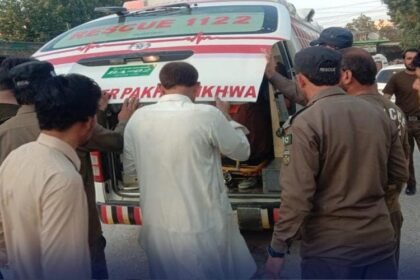A devastating incident unfolded onboard a Turkish Airlines flight, leaving passengers and crew in shock as one of the pilots tragically passed away mid-flight. The flight, which had taken off from Istanbul, was en route to its destination when the pilot suffered a sudden medical emergency, rendering him unresponsive. As the event progressed, it spurred an emergency landing and an urgent response from medical professionals. The incident has since raised significant concerns regarding the health and safety protocols in place for pilots and crew members in the aviation industry, bringing to light both the emotional and operational challenges faced by the crew during such unforeseen events.
The Incident: A Sudden Medical Emergency
The flight initially began like any other, with the crew and passengers unaware of the life-threatening situation that was soon to unfold. According to reports, the flight was cruising at its designated altitude when the pilot began showing signs of distress. Fellow crew members, particularly the co-pilot, quickly noticed that the captain had become unresponsive. With immediate concern for the safety of the passengers and crew, the co-pilot assumed control of the aircraft while cabin crew attended to the incapacitated pilot.
While attempts were made to provide first aid to the pilot, his condition rapidly worsened, necessitating swift action. Emergency protocols were initiated, and the flight was diverted to the nearest airport to allow for a prompt medical response. Upon landing, paramedics were waiting on standby to assist, but tragically, the pilot was declared dead soon after the plane touched down. Although initial reports suggest that the cause of death may have been a heart attack, the precise cause has not yet been confirmed, pending further medical investigation.
The Immediate Response: Ensuring Passenger and Crew Safety
Turkish Airlines, in a statement following the incident, expressed deep sorrow over the loss of the pilot. The airline reassured the public that passenger safety was always its utmost priority, and the swift actions of the co-pilot and crew ensured that the flight landed safely without any further complications. The airline’s official statement also confirmed that they were conducting a thorough investigation to determine the exact circumstances surrounding the pilot’s death, with an emphasis on reviewing health and safety protocols for flight crew members.
Turkish Airlines immediately implemented procedures to provide support for the passengers who had witnessed the incident. The airline arranged for counseling services to be made available for those who had been onboard the flight, recognizing the emotional impact that witnessing such an event can have on individuals. Many passengers reportedly expressed shock and sadness over the suddenness of the situation, and Turkish Airlines has committed to providing further assistance where needed.
The Role of the Co-Pilot: A Critical Player in the Emergency
One of the most significant aspects of the incident was the quick thinking and action taken by the co-pilot. In the aviation industry, co-pilots are trained to take over full control of the aircraft in the event of an emergency, including situations where the captain becomes incapacitated. In this case, the co-pilot’s ability to immediately recognize the gravity of the situation and execute the necessary emergency landing procedure was instrumental in averting a potential disaster.
The role of the co-pilot in such emergencies cannot be understated. The incident has renewed focus on the importance of having well-trained, experienced co-pilots who are fully prepared to manage a flight, regardless of unforeseen circumstances. Turkish Airlines, like many other global airlines, regularly conducts training sessions to ensure that both captains and co-pilots are well-prepared for medical and technical emergencies. This incident serves as a reminder of the critical role that co-pilots play in maintaining the safety of everyone onboard.
Aviation Safety Protocols: Are They Sufficient?
The death of the Turkish Airlines pilot has prompted widespread discussion within the aviation industry about the adequacy of current safety protocols and health checks for flight crews. While aviation authorities require rigorous medical exams for pilots, this incident raises questions about whether the frequency and scope of these exams are sufficient to detect underlying health issues that could pose a risk during flights.
In many countries, pilots are required to undergo regular medical examinations to ensure that they are physically and mentally fit to operate an aircraft. These exams typically include checks for cardiovascular health, vision and hearing assessments, and cognitive function tests. However, the sudden nature of the pilot’s death suggests that even routine medical exams may not be able to predict or prevent certain acute medical conditions, such as heart attacks, especially if they occur unexpectedly during a flight.
Experts have suggested that the aviation industry may need to review its health protocols for pilots and crew members, including more frequent medical exams and specialized health monitoring for conditions that may develop with age. Pilots, like many professionals, often face stressful working conditions that can take a toll on their health over time. The long hours, varying sleep schedules, and high levels of responsibility can all contribute to health complications, particularly cardiovascular problems.
Mental Health and the Stress of the Job
The tragedy of the Turkish Airlines pilot’s death has also brought attention to the mental and emotional health of pilots and other flight crew members. In recent years, there has been growing recognition of the importance of mental health support in the aviation industry, as pilots face unique challenges that can contribute to stress, anxiety, and other mental health issues.
Pilots are tasked with immense responsibility as they manage the safety of hundreds of passengers and crew members during each flight. The pressure to perform without error, combined with long hours and disrupted sleep patterns due to time zone changes, can create an environment ripe for mental health struggles. Airlines worldwide have been working to address these issues by providing pilots with access to mental health resources, including counseling and peer support programs.
In the aftermath of this incident, Turkish Airlines has reiterated its commitment to the well-being of its staff. The airline has highlighted the mental health resources available to pilots and crew members, encouraging them to seek help if they are feeling overwhelmed or stressed. It’s a reminder that the well-being of flight crews is not just a matter of physical health, but mental and emotional health as well.
Passenger Reactions: Dealing with Trauma in the Sky
The sudden death of a pilot mid-flight can have a profound emotional impact on passengers, many of whom may have never experienced such an emergency situation before. In this case, passengers were reportedly shaken by the incident, with many expressing disbelief that such a tragedy could occur during what was supposed to be a routine flight.
Turkish Airlines has responded to this by offering psychological support to all passengers who were onboard the flight, recognizing that witnessing a medical emergency in such close quarters can lead to feelings of fear, anxiety, and trauma. Passengers who were traveling with children, in particular, may face additional emotional challenges in explaining what occurred to their young ones. The airline is committed to providing ongoing support for these passengers, ensuring that they receive the necessary care to process the traumatic event.
The Importance of Comprehensive Medical Screening for Pilots
One of the key takeaways from this tragedy is the importance of comprehensive medical screening for pilots. While most airlines, including Turkish Airlines, adhere to strict guidelines for medical fitness, there is a growing conversation around how these guidelines can be expanded to include more thorough evaluations of cardiovascular health and other age-related conditions that may not be detected during standard medical exams.
In many cases, conditions like hypertension or heart disease can go undiagnosed if they do not present clear symptoms. Pilots who are middle-aged or older may be particularly vulnerable to such conditions, and experts suggest that airlines should consider implementing more specialized testing for these groups. In addition to routine exams, periodic stress tests or cardiac monitoring could help identify early signs of potential health issues before they become life-threatening.
The incident also brings to light the potential for pilots to experience health problems while they are already in the air, far from immediate medical assistance. This underscores the need for enhanced in-flight medical equipment and training for cabin crew members, enabling them to respond more effectively to medical emergencies involving crew or passengers.
The tragic death of the Turkish Airlines pilot mid-flight has sent shockwaves through the aviation industry and has raised important questions about pilot health, aviation safety protocols, and the role of mental health in high-stress jobs. The co-pilot’s swift and professional response ensured the safety of passengers, but the incident serves as a powerful reminder of the unpredictability of medical emergencies and the importance of preparedness.
As the aviation industry continues to learn from such tragedies, the well-being of flight crews must remain a top priority, with enhanced health screenings and support systems that address both physical and mental health concerns.
#TurkishAirlines #PilotDeath #AviationSafety #CrewHealth #MidFlightEmergency #AviationNews #TurkishAirlinesIncident #EmergencyLanding #MentalHealthInAviation #CardiovascularHealth #FlightSafety







